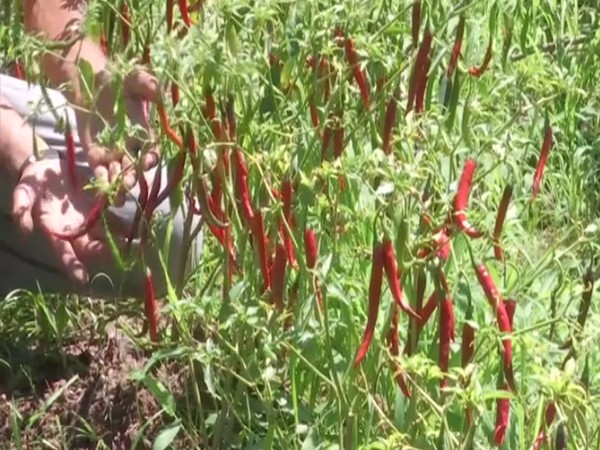Agripreneurship takes root in Jammu & Kashmir
Srinagar (Jammu and Kashmir) [India], December 28 (ANI): The idea of Agripreneurship has gathered much fanfare in Jammu and Kashmir in 2022. The administration has several schemes and farmer-centric reforms to support farmers and scientifically rebuild the agriculture system, preserving the soil and groundwater while increasing yield.

Today J&K ranks third on the list of the top five states based on farmers’ income. At the beginning of the year 2022, Lieutenant Governor Manoj Sinha promoted the increase in area under natural farming, giving an impetus to organic farming.
He said that natural and organic farming can effectively tackle the challenges of climate change and soil degradation. By extending financial assistance, and technological and marketing support to small and marginal farmers in this sector, a robust ecosystem of organic farming can be cultivated.
Kashmir is the ideal destination to experiment with organic farming because of favourable environmental conditions like low temperature and abundance of sun. The Agriculture Department is working on a blueprint to train farmers to grow a variety of organic vegetables in one field.
Rural Soil Testing Laboratories are being set up across Kashmir which will monitor soil health. Due to intensive farming in the past and replenishment of nutrients through fertilizers, the soil has developed multi-nutrient deficiencies, especially Nitrogen, Phosphorus, Potassium, Sulphur, Zinc, Iron, Manganese, and Boron. Soil testing will assist in making nutrient management decisions and improving the uniformity of nutrient application across fields.
Soil testing programs will help organic farmers as they would know which seeds to plant, and the productivity of land beforehand.
An award-winning progressive farmer Irshad Ahmad from Pampore, Pulwama, grows all kinds of organic vegetables on land spread over 10 kanals and earns him Rs 10 lakh annually.
He moves fast on new opportunities and technologies. Along with vegetables he also grows paddy and saffron organically. Though it’s much more challenging to grow any crop without the help of chemical fertilizers, farmers like him have sought to save the soil before it gets infertile as it has become in many areas of neighbouring Punjab.
Together organic farmers are forming clusters for trying new techniques and experimenting with seeds. Empty plots of hopeless land where weeds grow wild can be converted into vegetable gardens. Something as simple as chillis, tomatoes, and coriander can serve the poor. The young generation in Pampore views Irshad as a mentor and follows in his footsteps.
The use of chemical fertilizers in the agriculture fields might have increased yield but they have been a major cause of deadly diseases. The world’s healthiest people live in Europe; there is a direct relationship between the ban on artificial fertilizers and citizens’ excellent health.
As people are learning about organic food, they have started to prefer eating less than consuming contaminated food.
Farming is an excellent field to ensure financial security. (Organic) Vegetable Tourism seems to be the next big project of the J&K administration starting Spring 2023. In 2022, 9 lakh farmers were given seeds for free through government initiatives.
Gurez Village has been in the news for border tourism, winter tourism, adventure sports festivals, and for being the best nouveau camping site in Kashmir, but it’s surpassing others in the sphere of organic farming as well.
Gurez isn’t just cultivating organic peas, maize, wheat, lentils, potatoes, and kidney beans but also transporting them to other regions of India.
By filling credit gaps, introducing high-density plantations, building storage capacity, market linkages, and extension services J&K administration has rejuvenated agriculture and allied sectors. Farmers have a renewed trust in the government.
This December the Directorate of Agriculture, Kashmir, has been authorized as the Regional Council for PGS India Program. The program will help farmers obtain “organic-produce” certificates to fetch higher prices for their produce.
Krishi Vigyan Kendras (KVKs) in all 20 districts of J&K are hand-holding farmers through this paradigm shift. On December 12, 50 farmers in the Doda district began their lessons at the Natural Farming Training Program organized by KVK-Doda.
Atmanirbhar Bharat’s primary concern has been food security because quality nutrition precedes any kind of developmental work in a nation. Workshops across Kashmir are being conducted on Agripreneurship and agri-sciences. Central University of Kashmir (CUK) organized such a workshop on November 25 emphasizing new thinking in Organic farming, Sericulture, Apiculture, and Poultry farming.
In the last two years, continuous correspondence between eminent agricultural scientists, policy planners, policymakers, researchers, and farmer organizations has resulted in a futuristic roadmap for substantial growth in agriculture, dairy, livestock, poultry, and fisheries.
PM Modi’s dream of doubling farmers’ income will surely be realized. J&K is looking at self-reliance in all sectors in the next five years.




